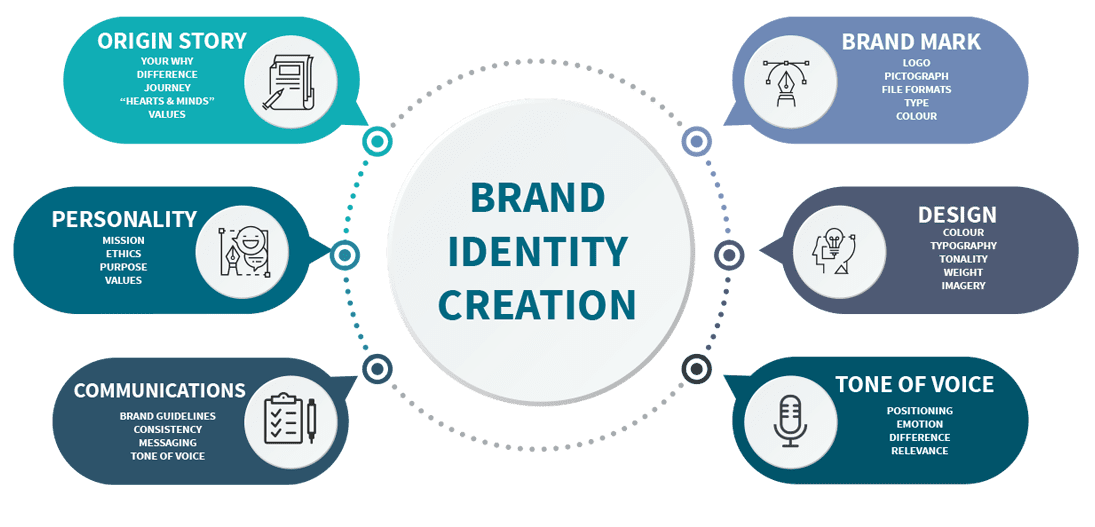Designing for Healthcare: How Visual Identity Shapes Patient Trust
In all industries, a strong brand is essential. It shapes how you are perceived and promises your customers or clients what they can expect from your company, products, or services.
In healthcare, where interactions can profoundly impact lives, from improving quality of life to life-and-death decisions, trust is not just important; it's the cornerstone of every interaction. Thus, it’s crucial that your brand identity portrays your business as trustworthy.
This article delves into the reasons why design and brand identity are crucial to health businesses and how they impact patient trust and loyalty.
What is brand identity, and where does design fit with Healthcare?
Your brand identity includes your brand's visual aspects (logo, website design, colour palette, typography, imagery) and your core messaging, tone of voice, mission, vision, and company values.
Design is a powerful tool that harmonises them to create a perception of your brand, a feeling about your company's essence.
Here, we will consider only the visual elements of your healthcare brand identity.

Why are design and brand identity important in healthcare?
In the dynamic and evolving landscape of health, the role of branding has never been more critical. It wasn’t that long ago that patients didn’t have a choice in healthcare providers or healthcare products; patients were synonymous with passivity, tolerance, and suffering in silence, and branding was something other industries did.
Today, patients are no longer passive healthcare recipients but empowered, technologically savvy consumers with high expectations.
They actively search online for information, products, and services before deciding. In this evolving landscape, where disease prevention is as important as treatment and the digital healthcare sector is booming, the competition for a patient’s attention online is fierce.
Healthcare businesses no longer compete solely on product, price, and service delivery; they compete on the experience provided, emotional connection, trust, and loyalty. This shift in dynamics necessitates re-evaluating our approach to brand identity in healthcare.
Your design and brand identity must resonate with patients, align with their values, communicate trustworthiness, and reinforce a commitment to their health and well-being, respecting their role in their health journey. It is your make-or-break first impression and how you foster that all-important trust and loyalty—the start of creating a meaningful relationship with your audience.
Fundamentally, trust is the first step in getting patients to listen to you or buy your services or products. Patients who perceive your brand as trustworthy are more likely to accept your message and explore your offerings, especially if it’s something new.
How do design and brand identity foster trust and loyalty?
There are several ways to foster trust in life. The three most common ways are through:
- #1 communication
- #2 connection
- #3 consistency
Studies have shown that it takes about 0.05 seconds for visitors to your website to form an opinion about your brand, determining whether they’ll stay or leave. In that short time, you can guarantee that the deciding factors are all visual design elements, not words.
Why?
Because humans are visual beings and can process images tens of thousands of times faster than text. Thus, design and visual identity are crucial to health branding.

#1 Communication
Design has the power to communicate your company’s values, establish a brand identity and connect with patients, creating a lasting impression of trustworthiness.
For example, calming colours (blues and greens) and clean, modern fonts have been shown to evoke a sense of professionalism.
A well-crafted, simple, and clean healthcare logo that is memorable and symbolic of trust, care and professionalism will resonate with patients, communicating your commitment to their care.
The challenge is ensuring that you deliver the right message visually and that every element works harmoniously to create a strong brand identity that establishes trust.

#2 Connection
Connections are made through a sense of familiarity, belonging, or a friendly welcome. They can also start when someone shows us empathy or compassion or listens to our needs and concerns.
Visitors to your website should feel you are on their health journey with them and that you understand their needs. You want them to have the same personable experience as if they were visiting your place of business.
A user-friendly design, an accessible website with relatable imagery, a strong, welcoming visual design, and intuitive navigation work together to encourage a visitor to stay a while and have a conversation, positively impacting trust.
A professional and patient-centric brand whose visual elements speak directly to patients across every touchpoint and respect patients as masters of their health journey is likelier to foster trust than a product or service-centric brand that feels disconnected and distant.
But how can design and brand identity consistency help you build patient trust?

#3 Consistency
When someone is consistent in what they say and do, you know you can rely on them, that their values hold, and that their message will remain unchanged no matter where or when you encounter them. You can trust and speak highly of them to others, showing loyalty.
Consistency in healthcare design and brand identity helps establish trust and build loyalty. Anytime your healthcare brand is visible to your audience, whether on your healthcare website, social media, or through print or digital marketing, everything must have the same visual message.
For example, when patients see your healthcare company logo consistently across various touchpoints, it reinforces your presence in their minds. It fosters a sense of familiarity and reliability.
It breeds trust and loyalty, encouraging patients to choose your services over others and potentially generating positive word-of-mouth and loyalty to your brand.

The Takeaway.
Looking to elevate your healthcare design and visual identity?
A strong brand identity is essential in the competitive healthcare industry. Creating meaningful connections, nurturing trust, and establishing a credible and authentic identity take knowledge and expertise.
As a brand and website design consultancy with clients across all health and life sciences sectors, we specialise in branding and understand the challenges and opportunities in medical and healthcare branding, especially in an increasingly consumer-driven industry.
We help clients navigate the pitfalls and increase their visibility in the marketplace.
Let us help you clarify your brand’s purpose and positioning, craft a cohesive and memorable visual identity and design asset communication to strengthen patient trust, cultivate loyalty, and differentiate your brand from the competition.


Belinda White | Creative Director